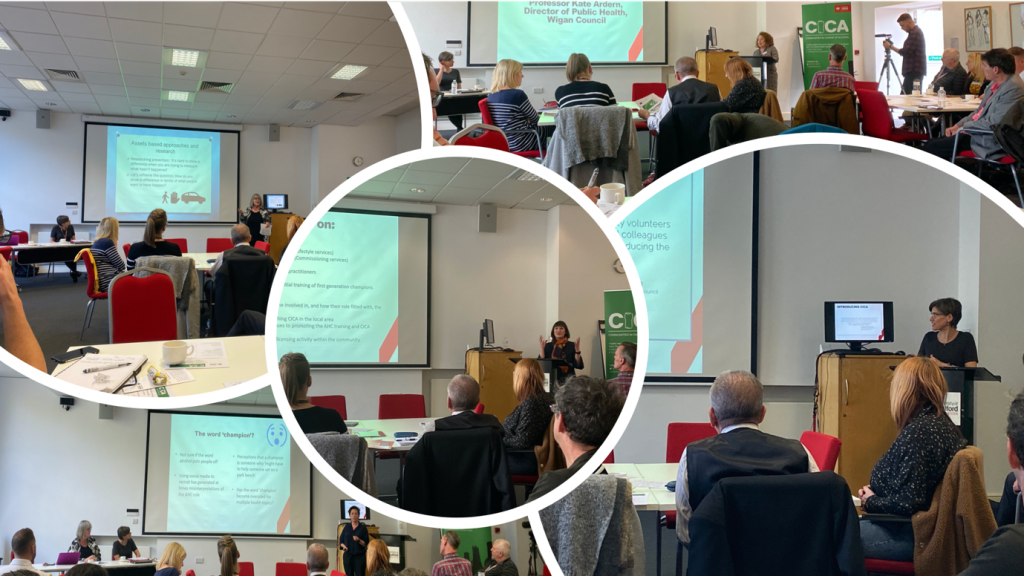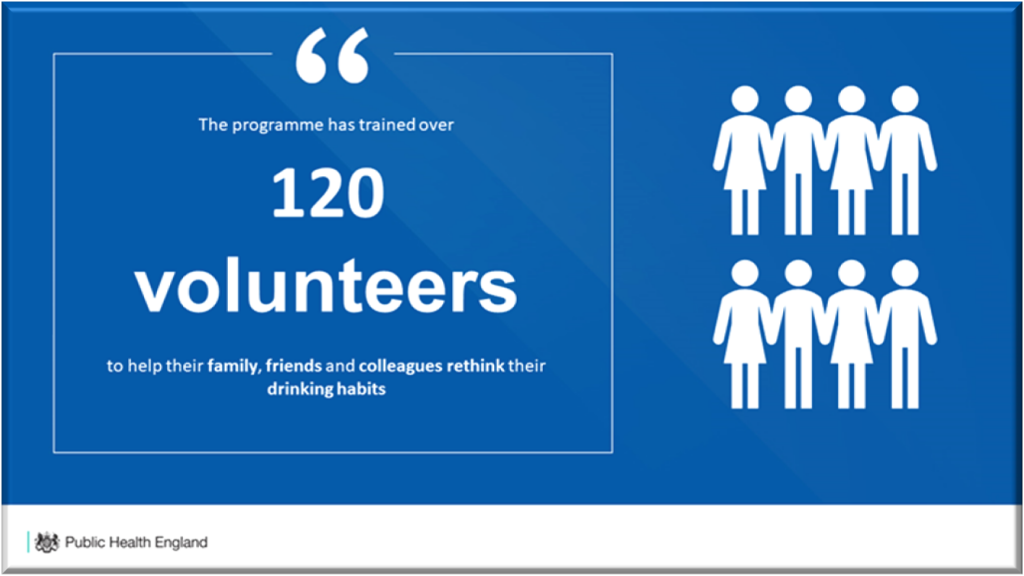By Suzy Hargreaves, CICA researcher
As we settle into 2020 and look forward to a year of evaluation and analysis, it seems a good opportunity to reflect on an event we held in the Autumn of 2019 to share preliminary findings from the Communities in Charge of Alcohol (CICA) programme. The programme was rolled out across Greater Manchester (GM) starting in September 2017. Community members from chosen areas across nine boroughs of the GM region were trained to become Alcohol Health Champions (AHCs). A two-day training event co-designed and delivered by the Royal Society of Public Health (RSPH), explored how alcohol effects the body, how alcohol harm can be reduced and how ordinary community members can become involved in the alcohol licensing process. This led to a level two qualification in Understanding Alcohol Misuse. You can read more about the programme in this protocol paper. Each area involved in the intervention was followed up after the training sessions at different stages throughout the roll out and duration of the programme by the CICA evaluation team at the University of Salford.
On the 18th October 2019, preliminary findings from the early stages of the evaluation were shared with a variety of stakeholders who had been involved with both the initial set up of CICA and throughout its roll-out. There was a total of 27 delegates at the conference, held at the University of Salford’s Council Chambers in the Old Fire Station.
Throughout the day, Kiran Kenth (Director of National and Regional Programmes) and a colleague from the RSPH were filming footage to create a short film about CICA. They conducted short interviews with a mix of delegates, including AHCs, local co-ordinators of the programme, strategic Public Health leads and members of the research team. Footage from the film was circulated through social media during the Dry January campaign to raise the profile of CICA nationally.

The day opened with a welcome from Professor Penny Cook, the principal investigator of the evaluation research, from the Directorate of Public and Allied Health. This was followed by a brief introduction from Professor Ben Light, Associate Dean of Research and Innovation speaking about the role and importance of this type of research locally, nationally and internationally.
Dr Janet Harris, a reader in Knowledge Mobilisation at the University of Sheffield, was invited to chair the day and to give a talk on engaging communities in improving health. She gave a fascinating insight into how taking an asset-based approach in community development requires listening to the worries of community members, collaborative and partnership working and the importance of evaluation of the process of working together to deliver a research programme or intervention. An asset-based approach to research and evaluation were described as often being at odds with the needs of funders and commissioners of research and the difficulties this can present.

Penny Cook continued the day by taking us through a logic model, describing how the CICA programme worked in terms of: what we knew already at the start, what is not known about the ability of the community to work together to reduce alcohol harm, what the CICA programme will involve and how we will measure whether or not the programme has worked. Although the overall evaluation of the programme includes a process evaluation (how the processes of the programme affect how well it works or does not work), an outcome evaluation (led by the University of Bristol) and an economic evaluation (led by the University of York) the focus of the conference was on the early process evaluation findings.
Following on from this, Suzy Hargreaves, a researcher on the evaluation team, gave an overview of the characteristics of the different areas involved in the intervention. This included an overview of which datasets were used to select the areas which took part, with many of the areas using data on alcohol related hospital admissions and indices of multiple deprivation (IMD) as a basis. She described all the areas that took part in the CICA programme in order to put some of the early findings in context, using information available for each area: deprivation (the IMD decile), sex, ethnicity, housing tenure, access to healthy assets and the number of licensed premises.
Experience of recruiting and training alcohol health champions (AHCs)
Following the overview of the areas involved, Liz Burns, one of the co-investigators of the evaluation spoke about the experiences of recruitment and training of AHCs. Liz showed us how an infrastructure score was assigned to each area at the start of the evaluation, taking into account a number of variables (for example, the area had a service provider such as a lifestyle or drug/alcohol service in place). Using information gathered from questionnaires completed by AHCs at the start and end of their training, Liz took us through the numbers of people who had trained in the first 12 months in each area, baseline data on the demographics of those taking part and questions aimed to measure knowledge and confidence before and after training.

Alcohol health champion (AHC) experiences
Following lunch, a video made in 2018 was shared with the delegates explaining the history of the programme with experiences, motivations and hopes for the AHCs. This video can be found here. Liz Burns then shared the experiences of the AHCs of the training, recruitment and putting the training into practice. This information was gathered by the evaluation team using a combination of a sample of reflective diaries completed by AHCs througout their activities, activities reported via local co-ordinators through meetings with AHCs and the collection of a small number of narratives where AHCs described getting involved in the licensing process. AHCs also reported personal benefits of taking part in the training and their new role, and models of support for AHCs beyond the initial training were discussed.
Reflecting on barriers and facilitators to implementation
Dr Cathy Ure, the evaluation team’s project coordinator and researcher reviewed findings from the evaluation, exploring barriers and facilitators to implementing the CICA programme. These findings were based on in-depth, semi-structured interviews with 20 key informants, including Public Health Practitioners from lifestyle or commissioning services, licensing leads and tier three substance misuse practitioners. These interviews took place within three months of the initial CICA training and looked at how local leads became involved, challenges in establishing CICA in their local area, reactions and responses to promoting the AHC training, and thoughts on current licensing activity in the community. All the themes that were identified from the analysis of interviews were split to describe the challenges and facilitators to the establishment of CICA and Cathy discussed these in turn. Speaking to the key stakeholders revealed that each area began their CICA intervention with an individual set of circumstances affecting the implementation and the beginnings of embedding the intervention, including the successful recruitment and training of AHCs and how they understand and carry out their role.
Closing remarks
Professor Kate Ardern, the Director of Public Health for Wigan and co-investigator for the CICA evaluation rounded off the conference with her closing remarks celebrating the achievement of the AHCs and the CICA programme in Greater Manchester. Kate’s talk was a positive and encouraging way to close the conference enabling the delegates and evaluators to look forward to the next steps in the evaluation of the programme.
What did the delegates think of the day?
During the day we asked delegates to tell us why they had come along; these reasons can be seen below:

Nearly two-thirds wanted to use the day to gain further knowledge, and just under half attended as they had been directly involved in the CICA programme in their local areas. Two-thirds of the delegates completed an evaluation form at the end of the day and it looks like all the talks were well received, with all receiving a large proportion of “good” or “excellent” responses. We asked what aspects of the day were the most useful or enjoyable and responses included it being a useful background on and update on the progress of CICA, a chance to meet some AHCs and hear about their experiences and a good opportunity to find out about the ongoing analysis. Delegates also told us about some of the things that they would most like to find out more about as the analyses progresses, including: information on what works in terms of recruiting AHCs to the programme; a CICA “manual” for communities who might want to take the programme forward; further information on community involvement in licensing; and, developing communication strategies as part of rolling out or expanding the CICA programme.
Thank you
We would like to take the opportunity to thank all those who came and took part in the day and contributed with comments and feedback, involvement in the filming and interaction throughout the day. A particular thanks goes to the alcohol health champions who were able to join us. We hope to be able to share further findings as the evaluation progresses. In the meantime, please keep in touch with us CICA@Salford.ac.uk and look out for updates on our Twitter account: @CICA_NIHR
Leave a comment